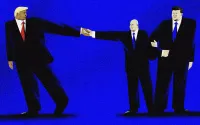8 January 2007Yahoo News!Brian Ellsworth and Christian Oliver
Venezuelan President Hugo Chavez accelerated his socialist revolution on Monday by seeking increased powers from Congress, nationalizing utilities and telecommunications companies and promising to strip the central bank of its autonomy.
The anti-U.S. leader, who was re-elected by a landslide last month, launched his bold new policy drive in a fiery speech likely to stir up opposition charges that he is seeking a centralized, Cuban-style system.
Chavez said he would submit a "revolutionary enabling law" to legislators through which he would be able to pass bills by decree to rush through socialist economic packages. The measure should sail through Congress, dominated by Chavez loyalists.
"Nothing or no-one will be able to push us off course us in our pursuit of ... Venezuelan socialism, our socialism," he said at the swearing-in of the OPEC heavyweight's cabinet ministers.
Chavez, in power since 1999, said he would nationalize Venezuela's largest telecommunications firm CANTV and unspecified power companies in the fourth biggest oil exporter to the United States.
Chavez skirmished with CANTV earlier this year, saying he would nationalize the firm unless it adjusted its pension payments to match the minimum wage.
Venezuelan bonds fell by more than 1 percent after Chavez's speech.
"These disconcerting policy announcements represent a clear turn into deeper nationalist and interventionist policies, which can lead to further erosion of business confidence and the country's macro and institutional fundamentals," economist Alberto Ramos said in a Goldman Sachs research note.
Chavez's confiscations in the past have focused on land, distributing private estates, sometimes foreign-owned, to poor farmers.
CASTRO PROTEGE IN CARACAS
Chavez is pulling the disparate parties that make up his government into a single one, sparking accusations that he is seeking a Communist-style system. He denies the accusation, saying he will always allow opposition.
"He runs the risk - maybe it is what he wants -- of presenting himself as a first cousin of Cuban President Fidel Castro rather than part of the reformist left tradition," said Boston University Latin American expert David Scott (news, bio, voting record) Palmer.
But, giving ammunition to those who say he is centralizing the state, he has said only those loyal to his movement can serve in the army or work at the giant state oil company.
Chavez's decision last month not to renew the license of an opposition television channel has also drawn widespread international condemnation that he should not muzzle voices that speak out against his reforms.
In Monday's speech, Chavez called Jose Miguel Insulza, secretary-general of the Organization of American States, an "asshole" and called on him to resign for condemning his decision not to renew the channel's license.
Further describing his reforms, Chavez said central bank autonomy could not continue and called the institution's independence "disastrous."
"The central bank must not be autonomous, that is a neoliberal idea," he said.
Chavez has met resistance from central bank directors who object to the leftist president dipping into state coffers for lavish social spending of oil wealth, which wins him supporters but stokes rampant inflation.
Chavez also said foreign-run projects that convert the tarry, heavy crude of the Orinoco Belt in eastern Venezuelan into fuel would pass into state control, keeping up the pressure in along-running dispute.






